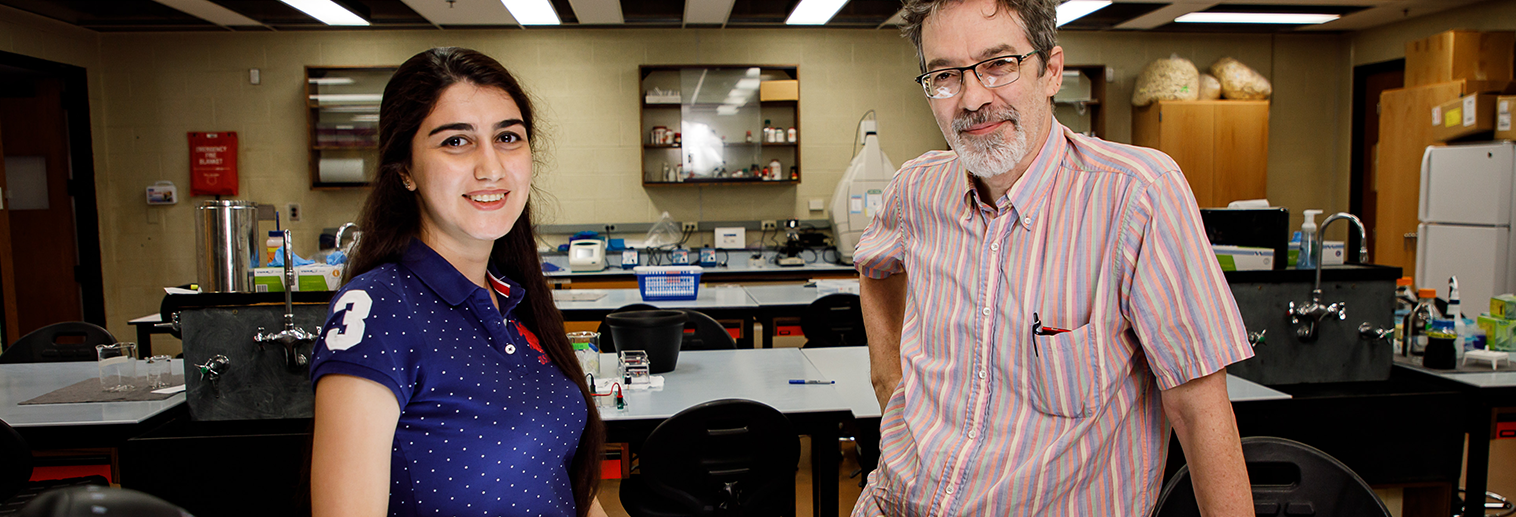Setareh Alipour ’20
"The effect of intensity of visual (dark & light) cues in Drosophila melanogaster larval learning memory"
Major: Biology
Hometown: Bethlehem, PA
Project Advisor: Dr. Jones
Briefly describe your project.
Associative learning allows animals to show proper behavior in their environment and helps them to understand causal and correlative relationships. Drosophila melanogaster is a wild type of fruit fly that has been used in scientific research due to its simplicity and convenience. The brain system of Drosophila melanogaster is much simpler than mammals, however, they share some genes that make the fruit fly an important case study. Drosophila melanogaster has a homolog gene of Presenilin (Psn) protein that its mutation on humans increases the risk for Alzheimer’s disease (AD). Therefore, for this study, we set an associative learning experiment to study a gustatory-visual associative learning ability between wild type Drosophila and mutant type of Psn to compare the learning performances. It is the first time that the effect of light intensity is measured and investigated on Drosophila’s learning ability.
We started with a visual experiment to detect the preferred situation for flies (dark/light). Then performed associative learning in two different conditions, Light+/Dark- and Dark+/Light-.Positive and negative stand for favorable and unfavorable conditions for the fly, which are Fructose and NaCl in our case. Multiple experiments in these different environments are held and results are statistically investigated to better understand the associative learning process in this animal. The final outcome of the research showed that a correlation exists between light intensity and the memory length in the wild type, while this correlation is noticeable less in the mutant ones.
Describe the origin of your project.
Dr. jones introduced the previous related experiments done with previous students. The subject was interesting to me and I added some new pursuits of research, such as the light intensity.
What’s the best part about working with your faculty mentor? What valuable insights have they brought to your project?
The whole 10 weeks of research was interesting and insightful for me. It was the first time that I was doing independent research. Dr. Jones was so patient and he taught me every step that was new to me. I learned a lot from him. Also, I learned how to research and it is a big achievement from my SOAR project that can help me in my future plans (grad school).
What has been your biggest obstacle so far?
My first obstacle was reading so many scientific articles that relate to my research. But after a while, I had a better feeling because it was not so hard, and makes me have more information with the background knowledge and significant ideas that have been established.
What has been your biggest takeaway from this experience?
As an international student, in the beginning, I was nervous about the presentation in front of so many people. I tried hard to show my best, I think I was successful during my presentation. This step taught me that if I try hard to achieve my goals, I can. Also, the whole project added a very valuable item to my resume, which helps me to apply for grad school.
What was the result of your project?
As we expected the larvae preferred dark area, and when we change the light intensity with three light sources the results varied significantly. More intense light make larvae to avoid moving towards the light area rapidly. Also when we trained them with food in a different area (dark & light) and then examined the associative learning, we find out they learned and remembered the food area, and made connections with food and their preferred area (dark). Also, I did some experiments on mutant larvae and got a similar result from them. But in general, mutant larvae were less sensitive to the intensity and learning process.
In your own words, how do you feel about being awarded this opportunity? Why should other students take advantage of the SOAR program at Moravian University?
It was a great opportunity for me. I am interested to apply to grad school for the next Fall. So this award helped me to show my research ability and will increase my chances to be admitted to grad schools.
Now that SOAR is over, do you plan to expand upon your research? If so, how?
Yes, actually I need to enhance my research ability, so I will take independent study for the Spring semester. I think it is a good opportunity to show how can I be productive at research and experiment.
Have you, or do you plan to present this research outside the SOAR presentations?
Yes, it would be great to have other presentation about my research, I am also going to take independent study for the Spring semester. And I am going to work on almost the same idea, of course not exactly the same research. I hope that I can get more convincing results so that I can present my research on a bigger platform.

